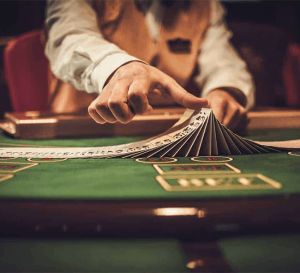Blackjack Insurance - Explained
All you need to know about Blackjack Insurance
Looking for a good casino game to play? Blackjack is one that should be on your list. You will be playing against the dealer. The goal is to have a set of cards higher than the dealer, which should have a value as close as possible to 21 without going over. With a house edge of .5% to 2%, it is one of the games wherein the casino has a low advantage, which increases the chances of winning, hence a Blackjack Insurance comes into play.

Blackjack Insurance
Before playing blackjack, be familiar with the bets that you can make. Among others, one of the most popular is blackjack insurance. This is a type of side bet that can help minimize your loss. However, it can also be a risk and can make you lose more. If you want to know more about what is insurance in blackjack, we got you. This short guide will not only let you know what it is, but we’ll also talk about how does insurance work in blackjack.
So, What is Blackjack Insurance?
Insurance in blackjack is a form of a side bet made when the upcard of a dealer is an ace. This is betting that the outcome of the dealer’s cards will be 21 once the hole card is shown. It is played separately from the main wager. The payout is 2:1. This means that for every $1 that you bet, you will win $2 if the second hand of the dealer is a ten or a face card, which also has a value of ten.
It is called insurance because it provides you another way to win. You can still win money even if your main bet loses. On the other hand, if the dealer’s card does not total 21, then you will only be losing the insurance bet and the game will proceed as usual.
When you place an insurance bet in blackjack, six things can happen. In each of the scenarios below, we will also talk about the possible outcomes. In these examples, the assumption is that your insurance bet is $50, and your main bet is $100.
- The dealer’s cards will have a total of 21 and yours is not. You win the insurance bet, but you lose the main bet. There is no loss or gain.
- Your cards will have a total of 21 and the dealer cards are not. Blackjack pays 3:2, which means that your main bet will win $150 and you lose the $50 insurance bet. Still, you will gain $100.
- You and the dealer will both have cards that total 21. Your initial bet will be returned. You win your insurance bet. The net gain is $100.
- You and the dealer both do not have a blackjack and the game ends as a tie. The initial bet is returned. The insurance bet is lost. This means that you will have a net loss of $50.
- You and the dealer both do not have a blackjack and your hand wins. You win from the initial bet, but you lose from the insurance bet. The net win for this scenario is $50.
- You and the dealer both do not have a blackjack and the dealer wins. You lose both your initial bet and your wager in insurance. This is the worst scenario since this means that you will lose $150.
When Should You Take Insurance?
When making this type of bet, you should know the blackjack insurance rules. One of the most important is that the upcard or the first card of the dealer should be an ace. This is counted as an 11 and not one.
Also, it is best to take insurance only when you are a pro in counting cards. This is a complicated skill reserved for the pros. If you know card counting, then it is easier to increase the chances of winning.
Taking insurance is also a good thing when you are winning. This means that you have more than what you have started with. In this situation, you will be comfortable at losing, and hence, you can be brave enough to take an insurance bet even if you know that the casino has an edge.
Odds of Insurance Bets
For a better understanding of what is the insurance in blackjack, let us take a look at the odds. The odds refer to the possibility of winning. This will give you an idea if it is worth taking the risk.
The odds of winning are not the same. Different factors will have an impact on the odds, such as the house edge or the advantage that the casino has over the player. In a one-deck game, the house edge of the casino can be up to 5.8%. If the casino is using more decks, then this can go higher.
Meanwhile, the odds that the dealer will make a blackjack is 9:4. This means that on average, you will lose more than half of your bet, which is why insurance is generally not recommended.
Pros & Cons of Blackjack Insurance
One of the good things about an insurance bet is that it increases your chances of winning in case you lose the initial stake. However, take note that this is only the case if you are playing a game with multiple card decks. This means that the more decks there are, the more cards there will be with a value of ten, increasing the chances of a natural blackjack.
However, the biggest disadvantage of insurance is that almost all experts agree that it is a bad strategy. Looking at the mathematical assumptions, the odds of winning are low.
Final Verdict
At this point, we hope that you already know what is the purpose of insurance in blackjack. In a nutshell, the goal is to give you the chance to win even if the initial stake loses. However, it does not go without risk. There is a chance that you will lose both your initial and insurance wager, so be sure to tread with caution.
Ready to try how insurance in blackjack works? Check out Digibet today!

